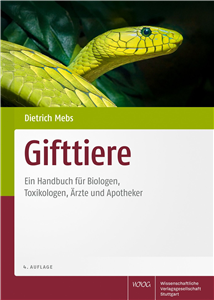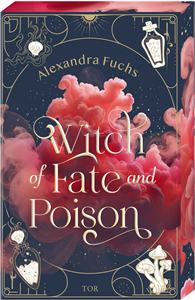Your Search Results
-
Promoted Content
-
Promoted Content
-
 Trusted Partner
March 2023
Trusted Partner
March 2023Toxic Positivity
Wie wir uns von dem Druck befreien, immer glücklich sein zu müssen
by Goodman, Whitney
Aus dem amerikanischen Englisch von Franka Reinhart
-
 Trusted Partner
April 2025
Trusted Partner
April 2025Toxic Spirituality
Wie man Irrwege erkennt und wirklich frei wird
by Wallis, Christopher
Aus dem amerikanischen Englisch von Brigitte Heinz und Hajo Normann
-
 Trusted Partner
Literature & Literary StudiesAugust 2023
Trusted Partner
Literature & Literary StudiesAugust 2023Poison on the early modern English stage
Plants, paints and potions
by Lisa Hopkins, Bill Angus
Many early modern plays use poison, most famously Hamlet, where the murder of Old Hamlet showcases the range of issues poison mobilises. Its orchard setting is one of a number of sinister uses of plants which comment on both the loss of horticultural knowledge resulting from the Dissolution of the Monasteries and also the many new arrivals in English gardens through travel, trade, and attempts at colonisation. The fact that Old Hamlet was asleep reflects unease about soporifics troubling the distinction between sleep and death; pouring poison into the ear smuggles in the contemporary fear of informers; and it is difficult to prove. This book explores poisoning in early modern plays, the legal and epistemological issues it raises, and the cultural work it performs, which includes questions related to race, religion, nationality, gender, and humans' relationship to the environment.
-
 Trusted Partner
MedicineJune 2012
Trusted Partner
MedicineJune 2012Poison, detection and the Victorian imagination
by Ian Burney, Bertrand Taithe, Roger Cooter, Carolyn Steedman
This fascinating book looks at the phenomenon of murder and poisoning in the nineteenth century. Focusing on the case of William Palmer, a medical doctor who in 1856 was convicted of murder by poisoning, it examines how his case baffled toxicologists, doctors, detectives and judges. The investigation commences with an overview of the practice of toxicology in the Victorian era, and goes on to explore the demands imposed by legal testimony on scientific work to convict criminals. In addressing Palmer's trial, Burney focuses on the testimony of Alfred Swaine Taylor, a leading expert on poisons, and integrates the medical, legal and literary evidence to make sense of the trial itself and the sinister place of poison in wider Victorian society. Ian Burney has produced an exemplary work of cultural history, mixing a keen understanding of the contemporary social and cultural landscape with the scientific and medical history of the period. ;
-
 Trusted Partner
2025
Trusted Partner
2025Poisonous Animals
A handbook for biologists, toxicologists, physicians and pharmacists
by Dietrich Mebs
From slithering snakes and creepy-crawly spiders to glowing jellyfish – venomous creatures evoke both fear and fascina- tion. Over millions of years, they have evolved remarkable defence mechanisms and lethal cocktails. Their poisons are used to capture and break down their prey. However, due to improper handling or lack of awareness, they can also pose a threat to humans. This book explores the fascinating world of venomous creatures on land and in the sea – and uncovers their secrets: • Where do bites, stings and poisonings pose a risk? • What substances do animal venoms contain and how do they act? • How should first aid be administered and how are poisonings treated? The 4th edition has been expanded to include additional venomous species, along with fascinating new case studies and illustrations. Discover the captivating world of nature’s poisonous creatures – well worth the risk! Target group: Biologists, toxicologists, pharmacists, physicians, travellers (also off the beaten track), scuba divers, nature lovers, interested laymen
-
 Trusted Partner
February 2004
Trusted Partner
February 2004Der Schwarm
Roman
by Schätzing, Frank
Whales begin sinking ships. Toxic, eyeless crabs poison Long Island’s water supply. The North Sea shelf collapses, killing thousands in Europe. Around the world, countries are beginning to feel the effects of the ocean’s revenge as the seas and their inhabitants begin a violent revolution against mankind. At stake is the survival of the Earth’s fragile ecology – and ultimately, the survival of the human race itself. The apocalyptic catastrophes of The Day After Tomorrow meet the watery menace of The Abyss in this gripping, scientifically realistic, and utterly imaginative thriller.
-
 Trusted Partner
April 2004
Trusted Partner
April 2004Mass Toxic Torts: Zum Problem der kausalen Unaufklärbarkeit toxischer Massenschäden.
Eine rechtsvergleichende und interdisziplinäre Studie.
by Seyfert, Christian
-
 Trusted Partner
Children's & YA
Trusted Partner
Children's & YASeawalkers (2). Rescuing Shari
by Katja Brandis/ Claudia Carls
For the attention of all Seawalker fans: the marine shapeshifters are back, with Volume 2 of this bestselling, shapeshifter series about Tiago, the young tiger shark, and his friends! Tiago is happy because he’s not only been admitted to Blue Reef High School, but also because at last he’s found a friend in Shari, a dolphin shapeshifter. The young tiger shark really needs a friend, because not everyone is happy to have him around. He is constantly clashing with the shady lawyer Lydia Lennox, and he has made himself unpopular by trying to track down the rubbish gangsters who are poisoning the nature reserve near the school. The situation reaches a climax during an anthropological research trip to Miami. When Shari gets into serious difficulties, Tiago as both human and shark takes a huge gamble in order to save her and her dolphin friends. The Seawalker books are published every six months. Previous publication: Seawalkers (1). Dangerous Shapes.
-
 Trusted Partner
Trusted Partner
-
 Trusted Partner
Trusted Partner
-
 Trusted Partner
Trusted Partner
-
 Trusted Partner
December 2024
Trusted Partner
December 2024Poison - Schwestern der Vergeltung
Ein neuer Fall für Special Agent Pendergast. Thriller
by Preston, Douglas Child, Lincoln
Aus dem amerikanischen Englisch von Frauke Czwikla
-
 Trusted Partner
Trusted Partner
-
 Trusted Partner
Trusted Partner
-
 Trusted Partner
Trusted Partner
-
 Trusted Partner
September 2024
Trusted Partner
September 2024Ivy und das Herz des Poison Garden
Ivys zweites fantastisches Abenteuer in einem nordischen Garten voller Wunder und magischer Pflanzen
by Gesa Schwartz
-
 Trusted Partner
August 2023
Trusted Partner
August 2023Ivy und die Magie des Poison Garden
Ein fantastisches Abenteuer in einem geheimen Garten voller Wunder und magischer Pflanzen
by Gesa Schwartz
-
 Trusted Partner
Trusted Partner
































